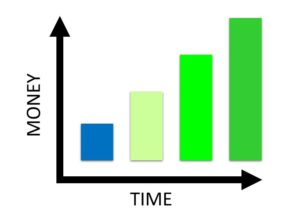It’s time to sell your home, or your parents home. Only problem? It contains 30, 40 or more years worth of stuff. Your real estate agent says, “I can’t list this house until you declutter!”
Don’t panic.
The good news is that if you live in an area that’s in high demand, such as the San Francisco Bay Area, you’ll probably sell your home for a lot more than you or your parents paid for it.
Of course, recent interest rate hikes mean a smaller pool of buyers. If this means delaying the sale of your home, this could actually be a good thing. If the house is filled with 30, 40 or more years of stuff, you’re going to need time to get the job done. You can start planning for the “big downsize” and perhaps by the time you’re ready, interest rates will have flattened or lowered.
There’s a formula about time and money that’s significant here.
If you just have time, you have options.
If you have both money and some time, you have more options.
No time and no money? Start praying for either.
According to the National Association of Productivity and Organizing Professionals (NAPO), more than half of Americans are overwhelmed by the amount of clutter they have. Most Americans have no idea what to do with it or find it too complicated to deal with so they let it build up, taking over their homes and offices.
Time Only
More time means you can chip away at the process of decluttering your home. It could take weeks, months or even years depending upon how much stuff you have and your habit (or lack thereof) of decluttering over time. With a plan, however, it can be done.
If it all feels too overwhelming, you can always hire an organizing coach to help you come up with a plan you can execute alone or with help. You can also hire a solo professional organizer to work with you over time. Just don’t expect one organizer to get your home decluttered in a week if you haven’t done anything in years!
Money and a little time
If you have less time to spare but expect a good return on the investment you made in your home, there is a relatively quick way you can get rid of years of clutter. This is a good option if you are pressed to get your home on the market soon. Keep in mind, this is the more costly option. Think of it as the price you pay for keeping years and years worth of stuff you didn’t need, never used, never purged or kept “just in case.”
This solution involves hiring a professional organizing company that offers a team-based or crew-based approach to getting your home decluttered. When you go this route you are multiplying the hands-on help and expertise you could get from one professional organizer.
Think of this as the pre-remodel phase of getting your home readied for sale. I call it the “pre-model.” How long does it take? It depends on how large and how cluttered your home is AND how quickly you can make decisions and how much energy you have.
What organizers can and can’t do
What organizers can’t do is tell you what to keep. This is not their job. That is your decision. You still have to make hundreds if not thousands of decisions. That being said, most good organizers make this process easier by pre-sorting and supporting or even humoring you to help you make decisions along the way.
If you’re in mid-life, you may have enough energy to make decisions, with the help of a great team, for several hours. Seniors and those with cognitive conditions can take longer or only have enough energy to make decisions for a shorter time. A qualified professional organizing company will take this into account when planning your project.
When you hire a company that can thoroughly and efficiently get your home downsized, this doesn’t mean you can go off to Tahiti while they work. It means that the organizers will take care of most if not all of the physical and logistical demands of getting your home downsized and decluttered.
This could include everything from arranging for haulers, scheduling charity pick ups. selling your unwanted items, purchasing supplies, ordering dumpsters, arranging for document shredding and re-organizing all your retained items until the movers come. It also means sorting and containing everything you don’t want or need from donated items to trash.
What will help you?
Keep only what you enjoy, what you use or would seriously miss if it disappeared. Your new home may be half the size or your current home. Remember you are doing this for a reason. No object is more important than you are.




